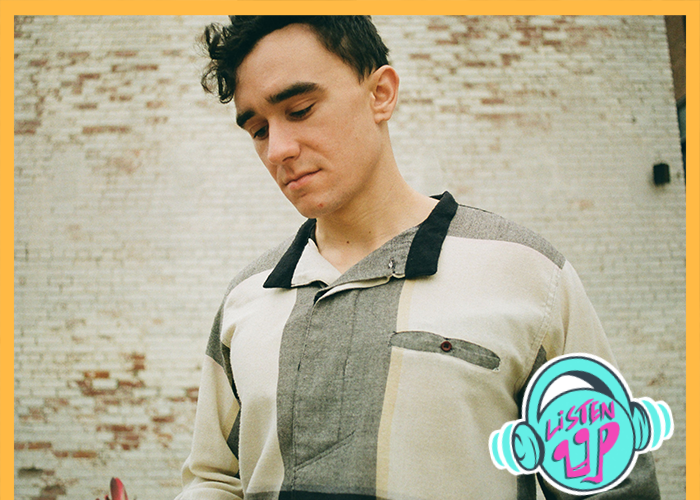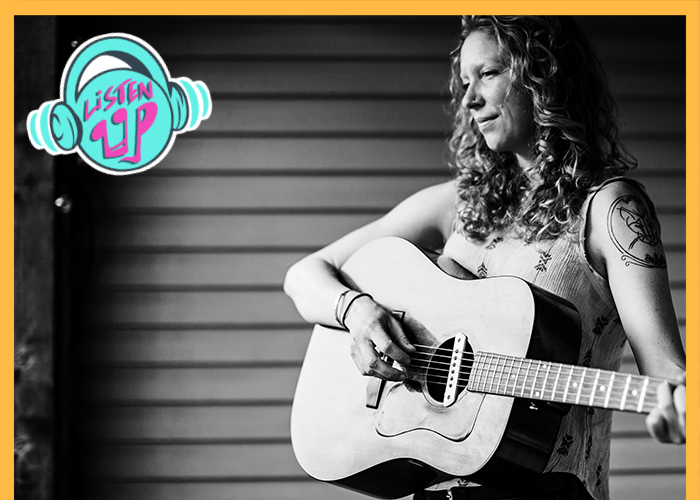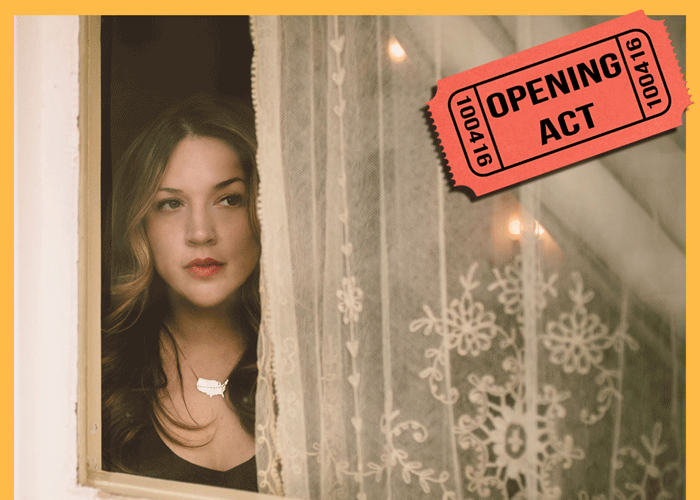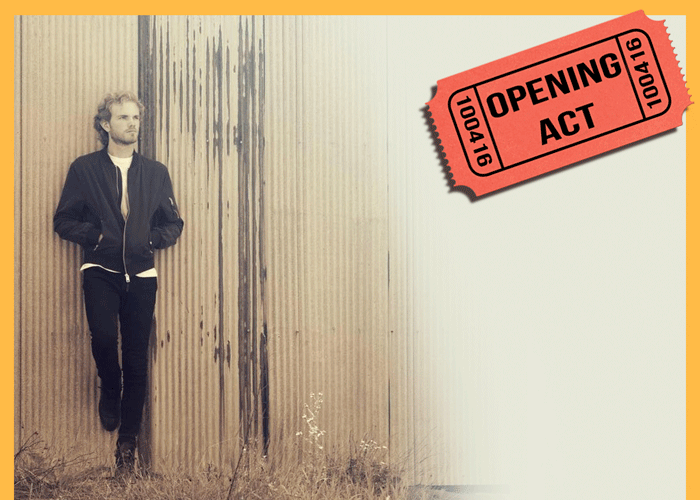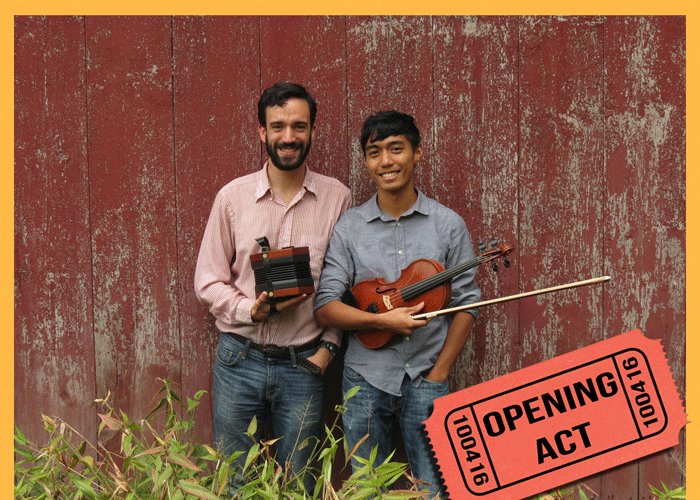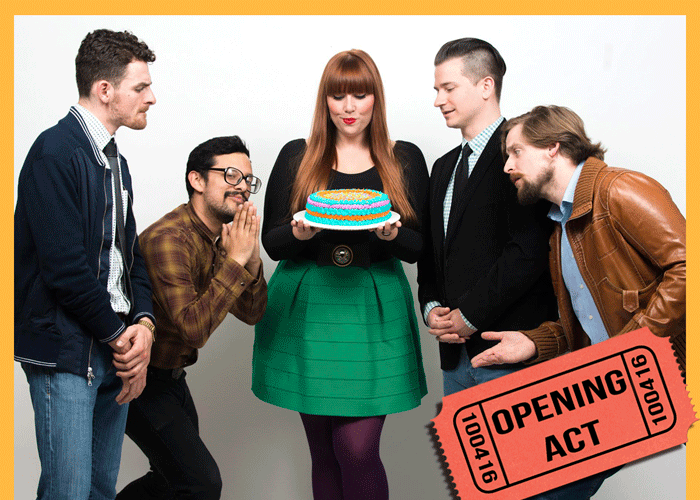You don’t know Jack? Well, get to know him – Jack Keyes that is. The Kentucky-based folk artist recently released his single “Ferdinand” to the masses, and he’s sharing a live acoustic version of it exclusively with us. Come for the music, and then stay for our seven question session where we chat about his upcoming debut album, The Moon is Too High.
folk
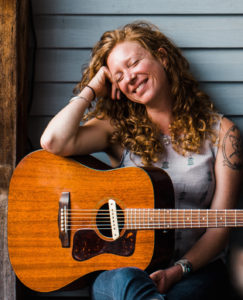
As smooth and as beautiful as Alicia Viani’s music is when it flows from her guitar, the emotions she pours into each and every song paints a more complicated portrait of an artist who celebrates the good and the bad that life has to offer.
“Life to me is a beautiful, hilarious, sorrowful circus with incredible highs and incredible lows and unfairness and injustice and growth and evolution and hopefully some of those themes, if I expressed them well enough and people listen close enough, come through the ‘warm country folk,’” she said in an exclusive interview with TrunkSpace.
The singer-songwriter’s self-titled debut is available now.
We recently sat down with Viani to discuss the process of putting a record together, embracing mental health during the pandemic, and why she doesn’t hesitate to skip to the end of a book.
TrunkSpace: Who is Alicia Viani the artist, and, would the you who first picked up a guitar and started playing be surprised by the answer you’re giving today?
Viani: Nope, wouldn’t be surprised. I first learned C and G chords for a Joni Mitchell song while backpacking in the Trinity Alps at 15 and I’m still singing in the mountains! I’ve always had a full life with music as the consistent thread. Sometimes front and center like when pursuing classical oboe performance in high school and college, and sometimes background like singing songs with random people in random corners of the world. That’s still how it is.
TrunkSpace: You released your self-titled debut album on July 24. As far as moments in your life to-date, how big of an accomplishment is it for you to have this collection of songs out into the world?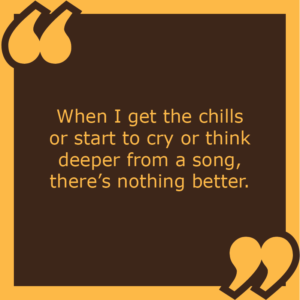
Viani: While the debut is super gratifying, I mostly loved the process. Working with a producer for the first time and hiring musicians who put their own spin on things, which was an interesting exercise in trust and relinquishing control for the goodness of collaboration, being in the studio, forming a band locally to release it… I loved all the steps leading up to the release. It’s such a vulnerable thing to release original music and the positive feedback has really lifted me. It’s the coolest thing to know your songs touch people and when they recite lyrics back to you that meant something to them.
TrunkSpace: With the pandemic happening not only in the country but around the world, did you consider pushing back the release? How did what was happening with Covid-19 impact your roll out of the music?
Viani: We did push back the release. It was originally set for April. We had a lot of momentum just beforehand with it charting #4 nationally on folk radio so it was disappointing to feel like the release kind of crashed and died, along with everything else live and collective! But in the grand scheme of things it was okay. The band was still excited about the songs and we were committed to doing it somehow, so Scott Oliphant (drummer, part of the Color Study, and owner of Parkway Sounds) offered his studio. We did a live online release with fabulous sound. He did an amazing job. So while it was a pause, we figured it out. We’re still sharing live music that way.
TrunkSpace: While you were no doubt focused on the album and promoting that particular collection of song, have you found yourself to be creatively-inspired during the pandemic? Has isolation lead to increased songwriting?
Viani: I’m trying to get outside more to exercise for my mental health, and I do my best writing on trail runs along the river with my dog. So that’s been fruitful. I’ve been more inspired to write from the huge civil rights movement going on, so I’ve got some ideas kicking around my head wanting to come out somehow.
TrunkSpace: What could someone learn about you as both an artist and as a person in sitting down to listen to your debut, front to back?
Viani: I’ve heard feedback that even though it’s easy and pretty to listen to and my singing has been compared to Nora Jones (which annoys me, I wasn’t going for easy listening, but oh well), that my brain and emotions are actually complex as fuck! Life to me is a beautiful, hilarious, sorrowful circus with incredible highs and incredible lows and unfairness and injustice and growth and evolution and hopefully some of those themes, if I expressed them well enough and people listen close enough, come through the “warm country folk.”
TrunkSpace: What are you most proud of with the upcoming album?
Viani: There is something so rad about a nice tidy bow on a completed project that is the fruition of many years of living, processing, crying, being in love, trying to jam big awkward concepts into a song, editing… it’s kind of the sum of my life to this point. In a CD case.
TrunkSpace: Where are you hardest on yourself as an artist and did that manifest during the creation of this particular collection of songs?
Viani: Performing and promoting the songs have always been the hard part. I’m a musician and a writer but have never taken much to the performance bit. I’m trying to embrace this concept that I have a “gift to share,” like people tell me! In between songs at a live show I have to remind myself to speak and tell some stories because it always stuns me when people want to hear from the artist. I’m always thinking we’re here for just the music, right? Also, releasing a record while there’s so much other important stuff going on in the world with the Black Lives Matter movement, the pandemic, people’s basic needs not getting met, was challenging because even though music makes everything better I wanted to be careful about how much space I took up.
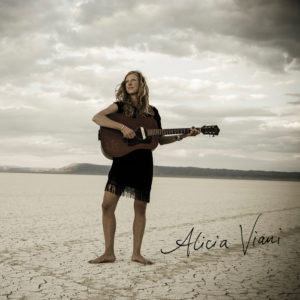 TrunkSpace: This year has been an emotionally trying time for everyone and the divide between people – at least in this country – seems to be growing. What kind of hand can music have in helping people find an internal balance and possibly even bringing people together? We have always been drawn to the idea of music being a shared experience, regardless if we get something different out of it than someone else.
TrunkSpace: This year has been an emotionally trying time for everyone and the divide between people – at least in this country – seems to be growing. What kind of hand can music have in helping people find an internal balance and possibly even bringing people together? We have always been drawn to the idea of music being a shared experience, regardless if we get something different out of it than someone else.
Viani: I love this question. Too many songs, especially political ones about social justice issues, tell people what to think. That’s not a good song. I wrote “Good man” after Trump’s election and had plenty of opinions to share about how white dominant culture wasn’t holding this man or ourselves accountable, but instead wrote the story of a guy named Jackson to explore racism and why one person wasn’t stepping up to interrupt racist acts. I was exploring through song something that was pissing me off in my life. Good stories enable us to feel empathy in places that surprise us, and while we’re holding ourselves and others accountable in this civil rights movement, we can all work on developing empathy to continue to see each other as human. I aim to write story-songs that draw people in and make them feel something about topics that usually repel people who are stuck in rigid corners about issues. And of course I go through the whole journey myself as the writer cause I can get rigid too, for sure.
TrunkSpace: What do you get out of songwriting on an emotional level? What is it about the process that most excites you even today?
Viani: Singing and writing puts me directly into that flow place where I’m in touch with my emotions but also being creative with them. Doing something about them. It’s just the best feeling. It’s precisely where the best songs come from. And then hopefully they prick at someone else’s emotions to help us connect to ourselves and each other. I live for that as an artist and a listener. When I get the chills or start to cry or think deeper from a song, there’s nothing better.
TrunkSpace: Time machine question. If you could jump ahead 10 years and get a glimpse of what your career looks like a decade from now, would you take that journey? If not, why?
Viani: Oh my god, absolutely. I cannot resist the temptation. I am the person who will read the last page of my book when I’m in the throws of a drama that’s just wrecking me with the suspense. I’ll still read the rest of the book of course, but let me know what the hell happens!
Viani’s self-titled debut is available now.
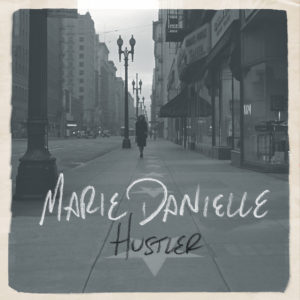 Artist/Band: Marie Danielle
Artist/Band: Marie Danielle
Website: www.mariedaniellemusic.com
Hometown: Harrisburg, PA
Latest Album/Release: Hustler
Influences: Joni Mitchell, Conor Oberst, Bruce Springsteen and Lucinda Williams are the biggest influences on the whole. I love storytellers. Lately, I’ve been listening to a lot of Father John Misty and Fleet Foxes. Television, Cate Le Bon and The Beach Boys.
TrunkSpace: How would you describe your music?
Danielle: Folk. My first record “Hustler” definitely had an Americana vibe to it. The one I’m working on now is darker, more electric. And definitely weirder. With a different sound than anything I’ve done before. We were talking about it in the studio… Interstellar Folk was the genre that stuck.
TrunkSpace: We’re all our own worst critic. Where are you hardest on yourself when it comes to your music?
Danielle: I always criticize my writing. Except for those songs that are rare bolts of inspiration, when they come pouring out of the universe, I find myself changing lyrics, altering chord progressions and just agonizing over what I’m trying to say and if it’s coming across.
TrunkSpace: We read that you have lived in both Los Angeles and in New York City. Have the cities themselves affected your songwriting? Did they elicit a particular mood that trickled into your writing?
Danielle: Absolutely. Right now, when I’m writing it often seems as if I’m still walking down Hollywood Blvd, even though I’ve been gone from LA for half a year. I had wanted out of Los Angeles for so long. I felt stuck. It felt like purgatory. It’s been a long time since I lived in New York, so it doesn’t have the same effect on me or my songwriting.
TrunkSpace: Honesty is always a powerful tool in songwriting, but do you ever worry about putting too much of yourself into your songs?
Danielle: I don’t think you can put too much of yourself in songs. I worry about it being disingenuous, worry about it not being me. About being phony. I like it when I’m a little afraid of playing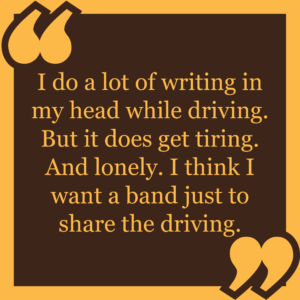 the song, scared to give too much away. If it isn’t a little dangerous, it isn’t worth doing.
the song, scared to give too much away. If it isn’t a little dangerous, it isn’t worth doing.
TrunkSpace: It sounds like that for a long time, your music was something that you kept very private and to yourself. Now that you share your music with the world, how has that creative openness changed your life?
Danielle: The more public my music became the more I wanted to make music. I left LA and started touring and working on a new record. I’ve gotten to play with a lot of amazing artists I really admire and met new artists that are fantastic as well. But, it does put the pressure on. Now I can’t just sit down and write a song the way I used to. There’s always the next record to think of, if it fits, if it’ll be done in time… thinking about all the professional aspects and then hoping it all still comes out authentic.
TrunkSpace: What does your songwriting process look like? Do you need to be in a particular mindset or creative zone in order to write?
Danielle: It really depends on the day. Sometimes it’s a chord progression, sometimes it’s a melody, or even just a title. And then you just have to keep chipping away, without forcing but without being lazy either. It’s a struggle. I hate writing but love having written.
TrunkSpace: You spend a lot of time on the road. Are you someone who feels at home on the highways and byways or is the physical aspect of touring a strain on you emotionally/physically?
Danielle: I love the road. There is a solitude about it, kind of like removing yourself a step away from society. And the driving is so meditative. I do a lot of writing in my head while driving. But it does get tiring. And lonely. I think I want a band just to share the driving.
TrunkSpace: Where are you most at home with your music? Is it on a stage or in the studio and why?
Danielle: I love being in the studio. Right now, I’ve gotten really lucky and have this great band from Mississippi backing me up, Young Valley. We just clicked and the next record will be interesting, it’s a bit of a departure from “Hustler.” I don’t think you can get that kind of transformation on the stage.
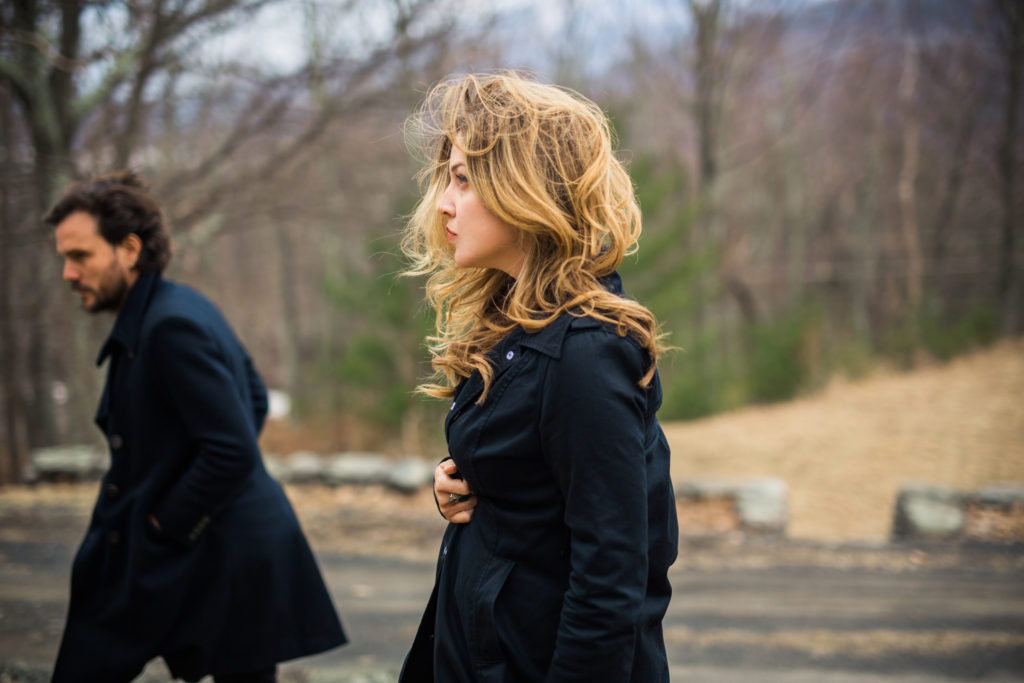
TrunkSpace: In your opinion, what is the most universal subject matter to write about… the thing that all listeners can relate to? It is love? Is it loss? Is it something else?
Danielle: I think that depends on who is listening, but to me, it’s love and loss. I don’t know if people want to hear about your happy days. Happiness tends towards the shallow. Losing someone you love is dark and tortuous. It has a depth to it. It’s unique and universal at the same time.
TrunkSpace: What can fans expect from Marie Danielle for the rest of 2017?
Danielle: I’m finishing the new record down in Mississippi. I’ve been working at this fantastic studio in Water Valley. Dial Back Sound with Bronson Tew. We have found such a great vibe for this record, we just hit it off and it’s like we’ve been playing together for years. I probably won’t release the new one ‘til early 2018, but it’s what this year is about. I’ll be heading back to Europe in the fall and touring some more in the US before and after that.
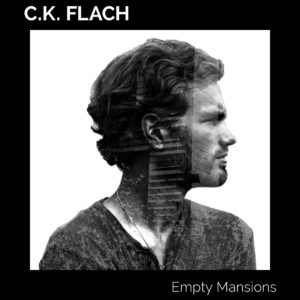 Artist/Band: C.K.Flach
Artist/Band: C.K.Flach
Website: http://www.ckflach.com/
Hometown: Ravena, NY
Latest Album/Release: Empty Mansions
Influences: Lou Reed, Conor Oberst, Neil Young, The Band, Bob Dylan
TrunkSpace: How would you describe your music?
Flach: I would describe it as alternative folk. I’m a big fan of folk and folk-rock sounds so I like to take those ideas and mix in certain elements to diversify the sound. I really just try to experiment and have fun with non-typical instruments like djembe, electric piano, udu drum, and even soundscapes.
TrunkSpace: You started out on drums. Is it safe to say that once a drummer, always a drummer?
Flach: I think so. The drums were my first love and what the drums will do in a song is always in the forefront of my thinking while writing a new piece. I think they are a very powerful element and I like to take advantage of that.
TrunkSpace: Your debut solo album “Empty Mansions” was released in February. You’ve played in bands in the past, but was stepping out on your own a daunting task? Being a solo artist offers creative freedom, but at the same time, it must also open up a certain space for vulnerability to work its way in?
Flach: Yeah, I was nervous about doing something on my own. “Empty Mansions” is entirely me… every instrument, every lyric, every track… so you can imagine my feeling of vulnerability releasing it. Fortunately, I was able to cut my teeth with other projects in the past which helped, as well as tremendous support from some key people. Overall though, I wanted to do it and put those nervous feelings behind me. It’s been a freeing experience and I plan to employ what I’ve learned with me on the next project.
TrunkSpace: You write a lot about the current state of things in the world. Is part of that a way for you to sort of absorb and find a self-understanding in the things that you see and hear?
Flach: It became apparent to me as I was forming these songs that are sort of a social commentary that I had to sort out the way I felt about some of them. Views and opinions I had changed over the course of writing and research, which I was a little surprised by. I’m happy to say I’ve grown from it and I’m perfectly willing to change. I try to be pretty open and honest. So yeah, I would say it had become a good way for me to process things.
TrunkSpace: When you look at the album now with a bit of separation, what is the most personal song that you included and do you ever second guess saying certain things in your songs over 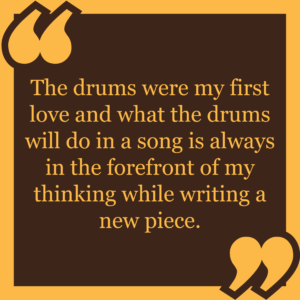 fear of saying too much about yourself in a public platform?
fear of saying too much about yourself in a public platform?
Flach: I really can’t say that any of these songs are biographical, but they are personal in the creative sense. I was a bit worried about a few lines throughout the album as far as content. I can get a little dark in my writing, but the world we inhabit can be a dark place and I don’t see the point of watering it down. The songs are honest and I think that’s important. My hope for my work is that people can identify with it, which means that I have to go beyond just my personal experience while maintaining a humanity to the lyrics. I do second guess myself sometimes, but I find myself just saying “go for it, what’s the worst that can happen?”
TrunkSpace: We’ve heard many artists say that releasing an album is like having a kid. With that in mind, do you see more kids in your future, particularly as a solo artist?
Flach: Absolutely, I’m already working out new material. I had such a good experience with “Empty Mansions” and I learned so much making it that I can’t wait to do it again.
TrunkSpace: You write poetry as well as lyrics. We’re curious, how many of your songs started out as poetry and then morphed into lyrics?
Flach: When I started writing, I kept both endeavors separate, but it has become difficult to do that. I think that as I have matured a little bit I’ve begun to develop a style that is more uniform. That is to say that my poetry and songwriting have now converged to a single style.
TrunkSpace: What is the biggest similarity between writing poetry and lyrics and what is the biggest difference?
Flach: Lyrics are more tedious because of the metrics involved; melody, rhyme scheme, length etc., whereas poetry is very free for me, but I try to approach both with an accessible language. The commonality is that I’m trying to communicate with the listener/reader and I try to do that in the most fluent and interesting way I can summon.
TrunkSpace: What is the best advice you’ve ever received in life as it pertains to your musical career?
Flach: To stick with it.
TrunkSpace: Great songwriting elicits emotions out of the listener. What do you hope people feel when they listen to your music?
Flach: Anything and everything. The spectrum of human emotion is broad and I hope to be able to create songs that encourage people to feel many things. From protest songs to ballads, songs can go so many places and I think the emotions follow.
TrunkSpace: What can fans expect from C.K. Flach for the rest of 2017?
Flach: A Northeast tour in June and a few one-off shows before and after that. I plan to start working on a new album as well.
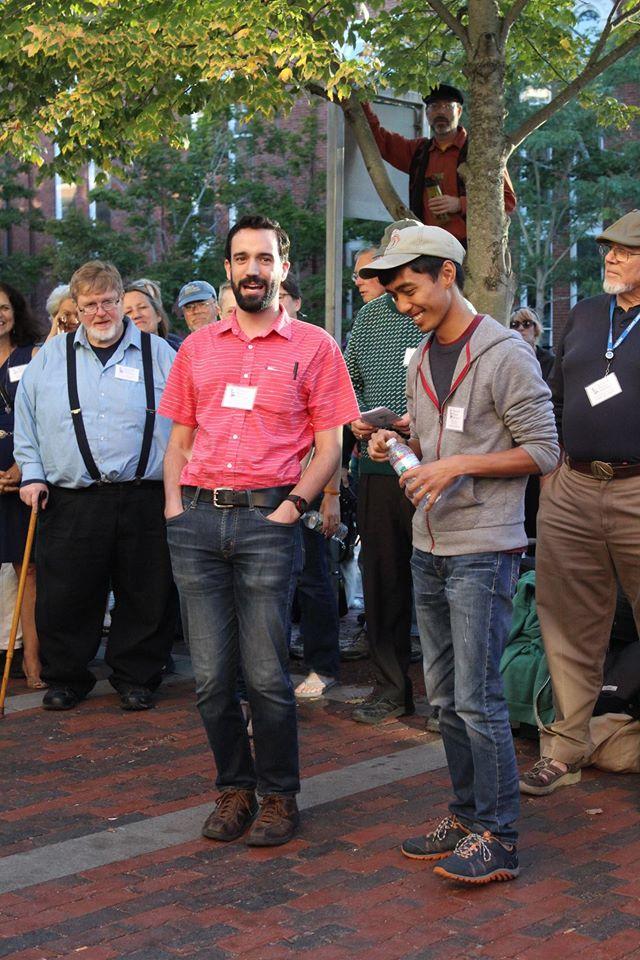 Artist/Band: The Vox Hunters
Artist/Band: The Vox Hunters
Members: Armand Aromin & Benedict Gagliardi
Website: https://thevoxhunters.com/
Hometown: Providence, Rhode Island
Latest Album/Release: debut album to be released in May/June
Influences: (There’s a lot!)
Jeff Davis & Jeff Warner, John Roberts & Tony Barrand, Will Duke & Dan Quinn, Almeda Riddle, Jeanne Ritchie, David Jones, Jerry Epstein, Bob Walser, The Watersons, The Copper Family, The Young Tradition, Doc Watson, Swan Arcade, Folly Bridge, Keith Kendrick & Sylvia Needham, David Webber & Anni Fentiman, Louisa Jo Killen
TrunkSpace: How would you describe your music?
Gagliardi: The majority of what we do is traditional folk music… old songs and tunes usually without known composers that have been passed down through the oral tradition. We come from an Irish music background where instrumental dance tunes (jigs, reels, etc.) reign supreme, but as a duo we primarily sing English and American songs. People often get confused and expect only Irish music out of us, but aside from the odd tune that I play for Armand to dance to, our repertoire as a duo is not heavy on the Irish music.
We also write some songs ourselves and sing other songs written by folk musicians, but they all share a certain humble aesthetic and fit comfortably in the folk music idiom. That being said, we recognize a good song when we hear one and we welcome a bit of musical varia that strays outside the folk music realm. We’re not averse to singing the odd Muppets song now and again.
TrunkSpace: The Vox Hunters have a unique sound. How did you come to discover your musical identity together?
Gagliardi: As I’ve said, we both spent many years playing Irish music, but at the same time we both love to sing. The Irish music communities in New England are close-knit and welcoming and bound together by a love of tunes (‘tunes’ meaning instrumental dance music… no words), but there is not a similar reverence for songs (i.e. with words) in these circles. In our experiences, singing at Irish music sessions is a rare solo occurrence that usually gives contrast to the upbeat medleys of dance tunes.
Aromin: Prior to meeting Ben, which was about 4 ½ years ago, I only really knew Irish music. Singing was very much a ‘hobby’ among my musical endeavors, but when we met, he introduced me to a whole facet of folk music that I never really knew existed. I’m a big fan of harmony, and singing has allowed me to explore that. You won’t find much of that in Irish music; however, it’s fairly common in other styles of folk music like English, Swedish, and bluegrass.
Basically, our musical identity is a happy cornucopia of many different influences. Our main drive is singing… singing together, singing with others, singing socially, and building community around singing rather than tunes.
TrunkSpace: Armand makes and repairs violins. Does understanding the inner workings of an instrument make you approach the play aspect differently than say, someone who doesn’t have an understanding of that side of the instrument?
Aromin: I can’t speak for others, but being a luthier has certainly changed the way I approach playing an instrument. Prior to enrolling in the Violin Making and Repair program at the North Bennet Street School in Boston, I was always under the impression that an instrument only sounds and plays the one way. If it doesn’t suit you, then it’s time to find a different instrument. I’ve since learned that is false as hell. There are a multitude of ways you can change how an instrument feels, and it all lies in the set-up. More often than not, this becomes a distraction for me, especially when an instrument I’m playing isn’t behaving the way it should. I’ll sometimes get lost in my head thinking of what needs to change, how I can go about doing it, and when’s the next time I have a free day. On the other hand, it’s nice to be able to work on my own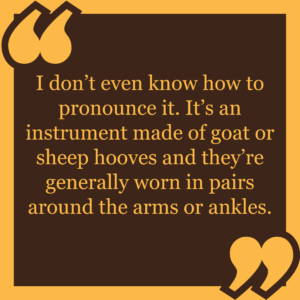 instruments and save money.
instruments and save money.
TrunkSpace: Your music seems suited for small, intimate settings, but at the same time, capable of filling the air (and ears) of a large venue as well. Do you approach a live performance differently based on the setting you’re performing in?
Aromin: As far as stage presence is concerned, we try to be consistent regardless of the venue. Repertoire is another story, but we like to maintain the laid-back, silly atmosphere wherever we perform. Not only does it make it easier for us as performers, but it also makes it more fun, and helps to get that exchange of energy going between us and the audience. We love participation, so we often sing songs with choruses that are easy for people to latch onto. It can be tough performing for a crowd that isn’t used to something like that, especially if we’re on a bigger stage and the audience is further back, and even more awkward when we’re being our usual selves and there’s zero response from them. That’s why our favorite venues are house concerts. It pays better, you get to hang out and chat with everyone, there’s usually food, and you can count on an enthusiastic audience to keep you going.
Gagliardi: Like Armand said, no matter the venue, we are consistent in our informality. Feedback from listeners has taught us that people enjoy hearing a good bit of banter between songs, some background stories, and observing our laughable/affable (laffable?) chemistry on stage.
When we perform at larger venues we usually have a better prepared set list than a house concert or smaller, casual gig. Part of the thrill of playing more intimate concerts is that the mood of the space might dictate the set list and we’d be more inclined to ‘wing it’. For instance, if people are singing along from the start, we keep the choruses coming.
TrunkSpace: Benedict has performed in a number of folk bands throughout the years. What did you learn in terms of the inner workings of managing a musical act during your time with those other projects that you have since applied to The Vox Hunters?
Gagliardi: One band I was part of (Old Hannah) was wildly creative and drifted off into musical territory I had no firm grounding in. That was always a fun exercise and helped to encourage an adventurous approach to arranging and interpreting folk songs. Playing with Old Hannah, as well as Shinbone Alley, in my college days opened my eyes to the thriving network of house shows and homegrown venues in New England that welcome creative and entertaining performers. These experiences taught me the joy of performing for small, music-loving audiences. It was with Shinbone Alley that I first played a house show in Providence and fell in love with the supportive and genuinely appreciative music scene that I would eventually become a part of.
Another group I was part of (Full Gael) was immensely adept at learning particular arrangements of tunes and songs and performing them consistently and professionally. Any bit of professionalism I demonstrate as a musician was shaped by my involvement with Full Gael. Likewise, my bandmates (Gary Palmer and Will O’Hare) taught me the business aspects of music and helped to strengthen my harmony singing.
TrunkSpace: You’re currently recording your first album. Can you tell us what fans can expect?
Gagliardi: If I may say so in a modest, non-bragging way, we know LOADS of songs in a variety of different styles (i.e. sea songs, ballads, drinking songs, love songs, gospel, etc.). Some we only ever sing a cappella and in the right setting, some we like to arrange with instrumental backing, some we’ve modified the melodies and lyrics of and harmonized in unique ways. What’s fun about singing traditional folk music is the variety of songs and styles and the ways you can reinterpret it. It’s hard to pinpoint a specific style that is most representative of our music, but I think the variety of songs we chose to include on the album does a decent job of describing what The Vox Hunters do. You can expect old American folk songs, a ballad or two, maritime songs, a bluesy number, some ditties from the British Isles, two originals, a couple of unusual dance tunes, and even an Irish song.
TrunkSpace: The Vox Hunters seem to really embrace the wonders of unique sounds and instrumentation. Are you working with any uncommon instruments on this album that we’ll need to Google just to see what they are, and if so, can you tell us what the sounds are that you’re creating with them?
Gagliardi: We’re hoping the novelty of playing uncommon free-reed instruments wears off soon after listeners hear what they’re capable of. We each play different types of “squeezeboxes” (Benedict plays the Anglo-German concertina and 1-row melodeon, and Armand plays English concertina). Other than that, Armand will be heard on tin whistle, jaw harp, and a fiddle of his own make (while sometimes singing simultaneously!). Benedict plays harmonica and tenor guitar (he can’t play ‘normal’ guitar) on a few tracks.
The strangest instrument on the album is probably wielded by our guest percussionist, our good friend Kyle Forsthoff. In the studio, he dumped out a whole bag of shakers, and within the pile was an instrument called the chajchas.
Aromin: I don’t even know how to pronounce it. It’s an instrument made of goat or sheep hooves and they’re generally worn in pairs around the arms or ankles. Kyle just clapped two of them together and it makes a satisfyingly wholesome sound. There’s also going to be Cajun triangle and Snare drum on the album. You won’t find much of that in Maritime music!
TrunkSpace: You’re based in Rhode Island, a state with a rich history of folk music and home to the Newport Folk Festival. What is the folk scene like currently and is it welcoming to new acts looking to make their mark?
Gagliardi: Rhode Island does indeed have a strong history of folk and especially traditional (trad) music. The Newport Folk Festival started as one of the foremost annual presentations of trad folk music highlighting national treasures like Almeda Riddle, Jean Ritchie and Pete Seeger to name a few. From a traditional musician’s standpoint, the festival no longer functions the same way. Although there is still a stage dedicated to traditional folk music, the festival’s focus has since shifted towards the more popular music of today.
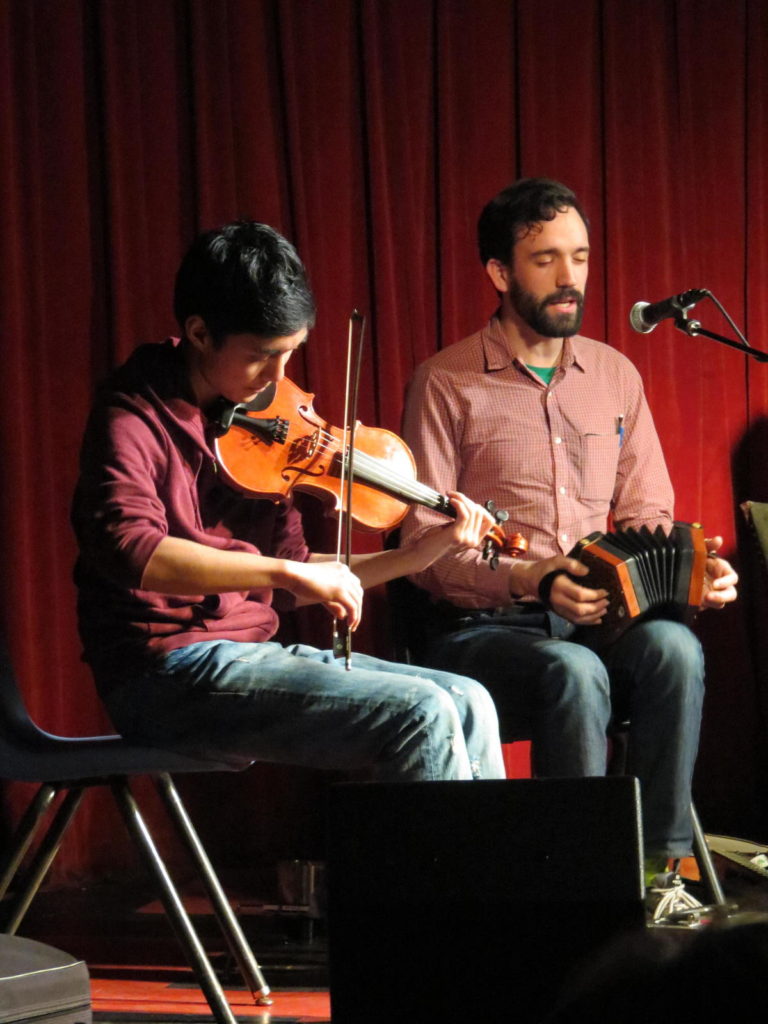 Today Providence is rich with a variety of music, and more importantly, musicians who respect and support the art of others and are willing to collaborate. Wikipedia will tell you that Providence’s main musical export is noise rock, but I can tell from experience that the city is teeming with good singers, songwriters, and instrumentalists. What’s truly wonderful about the music scene here is how different styles intermingle. You might go to a show at a local venue like AS220 or Aurora or The Parlour and listen to something as staunchly traditional as a solo oud player, followed by a local singer-songwriter duo, and then an acoustic metal doom band.
Today Providence is rich with a variety of music, and more importantly, musicians who respect and support the art of others and are willing to collaborate. Wikipedia will tell you that Providence’s main musical export is noise rock, but I can tell from experience that the city is teeming with good singers, songwriters, and instrumentalists. What’s truly wonderful about the music scene here is how different styles intermingle. You might go to a show at a local venue like AS220 or Aurora or The Parlour and listen to something as staunchly traditional as a solo oud player, followed by a local singer-songwriter duo, and then an acoustic metal doom band.
We are very interested in the old songs and traditional music from our state and we’re currently researching, collecting, and reviving Rhode Island’s hidden bounty of old folk music. There are plentiful contemporary folk songs written about the Ocean State’s historical figures, places, and happenings but we are most interested in old songs from the state’s past, such as the many broadside ballads printed in Providence in the 1800s, and the traditional songs collected from RI residents and immigrants in the 1940s for the Helen Hartness Flanders Ballad Collection. You can expect to hear an increasingly Rhode Island-centric repertoire from us as we delve deeper into this research.
TrunkSpace: What can fans expect from The Vox Hunters in 2017?
Gagliardi: First and foremost, fans can expect something more than a business card to be available at our gigs! Our debut album will be released in the next few months! Yahoo!
Additionally, after the recording is done and the album is out we will be focusing much more on our Rhode Island music research. You can expect to hear more local songs in our repertoire in the hopes that others will learn and sing them as well.
This summer you can catch us at a number of New England folk festivals, camps and concerts:
- Mystic Sea Music Festival (Mystic Seaport, Mystic, CT) June 8-11
- Swing into Summer (Pinewoods Camp, Plymouth, MA) June 16-18
- Warren Summer Concert Series w/ Atwater-Donnelly (Warren, RI) July 23
- TradMAD (Pinewoods Camp, Plymouth, MA) Aug 26-Sep 1
- Portsmouth Maritime Folk Festival (Portsmouth, NH) Sept 22-24
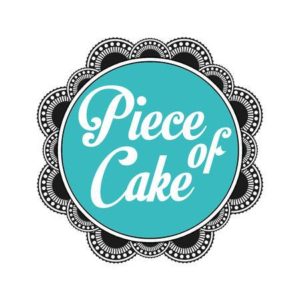 Artist/Band: Piece of Cake
Artist/Band: Piece of Cake
Members: Brynn Bixby (Lead vocals, keyboard), Dave Nolden (Bass, vocals), Rob Lejman (Drums), Mark Alletag (Sax, guitar).
Website: https://soundcloud.com/pieceofcakemusic
Hometown: Chicago (Northwest Burbs)
Latest Album/Release: Piece of Cake (May 2016) (Available at Spotify and Apple music)
Influences: Jenny Lewis, Fiona Apple, Spoon
TrunkSpace: How would you describe your music?
Bixby: I try not to, but if I have to pick a genre I usually start off with indie-folk-pop. Describing my music is one of the most difficult things for me to do. I’d rather someone just listen and take what they can from it. I was once told it sounded like Amy Winehouse meets Jenny Lewis, which is probably the biggest compliment anyone could ever give me, so I’ll go with that.
TrunkSpace: Everyone loves cake and when one is present, they want a piece. Is that reflective of your music as well? Does everyone want a Piece of Cake?
Bixby: I hope so. We have been pretty well received live. Our shows are always a good time and I think that we have a sound that most people can connect with. It’s not your usual lineup, so I think we bring something that you don’t hear in every bar/venue/backyard. I can’t speak for everyone, but I damn sure want a piece of cake.
TrunkSpace: Jokes aside, your music seems very accessible. And by that we mean, there’s something for everyone without alienating fans of any one sound. What was that initial conversation like when you guys got together to form the band? Was there a discussion about the sound you wanted to create or was it more of a natural blending of musical tastes that ultimately became what Piece of Cake is?
Bixby: I started writing songs for Piece of Cake back in 2012, when I was in another project, a pop-rock trio called Caught In Your Pockets. I was looking for a different sound and wrote a couple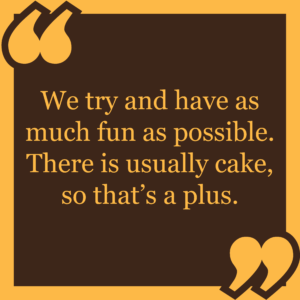 of songs that I themed around the idea of “Piece of Cake.” One was called “Sweet Tooth City,” another “Easy As Pie,” it was random and fun. It felt natural and freeing to write outside of what I was doing at the time. About two or three years later Caught In Your Pockets broke up and I went back to this idea. I haven’t actually used any of the tunes I wrote back then, I should revisit them, but I wrote “Somebody,” a ballad I recorded and released as the first Piece of Cake single. It was a totally different vibe than anything I had written before and I wasn’t playing with a band at the time. It really spoke to what I was going through emotionally; starting over, moving on, figuring out my self-identity as a songwriter. It opened up a new process for me, and I wrote a few more songs before I reached out to anyone to get together. I’ve known everyone in the band for at least eight years, and I just started jamming with them and getting their opinions on new material. It really came along after about a year, and we recorded our first album and started playing out regularly. Everyone involved has another project that they play with and a diverse musical background so it’s been a blast working on this. I am incredibly thankful to everyone who has been a part of it.
of songs that I themed around the idea of “Piece of Cake.” One was called “Sweet Tooth City,” another “Easy As Pie,” it was random and fun. It felt natural and freeing to write outside of what I was doing at the time. About two or three years later Caught In Your Pockets broke up and I went back to this idea. I haven’t actually used any of the tunes I wrote back then, I should revisit them, but I wrote “Somebody,” a ballad I recorded and released as the first Piece of Cake single. It was a totally different vibe than anything I had written before and I wasn’t playing with a band at the time. It really spoke to what I was going through emotionally; starting over, moving on, figuring out my self-identity as a songwriter. It opened up a new process for me, and I wrote a few more songs before I reached out to anyone to get together. I’ve known everyone in the band for at least eight years, and I just started jamming with them and getting their opinions on new material. It really came along after about a year, and we recorded our first album and started playing out regularly. Everyone involved has another project that they play with and a diverse musical background so it’s been a blast working on this. I am incredibly thankful to everyone who has been a part of it.
TrunkSpace: What is the key for a band in finding an audience in 2017? Is it hard work? Is it luck? Is it a combination of the two?
Bixby: I wish I actually knew the answer to this question, it would be very helpful to me. From what I can tell, it’s a combination of the two. Luckily, we have had a lot of support from friends, family, and other local musicians with this project. I am extremely grateful for that. Mostly, I think people want to hear something different that they can relate to. If you can’t engage, what’s the point?
TrunkSpace: The chicken or the egg question. Does a band decide its identity or do the fans decide it for them? When it comes to a band, how much of the scene that you ultimately find yourself in is defined by who is in the scene itself?
Bixby: It’s all about perception. I know what Piece of Cake is for me, and I know what I think we sound like, but that’s not how everyone interprets it. I try not to worry too much about how we are labeled or what genre we fit in. It’s exhausting. I find that what I consider to be the best bands are those that cross multiple genres and influences and just do their thing.
TrunkSpace: Speaking of scenes, Piece of Cake is based in Chicago, a city known for having a great music scene decade after decade. What are your thoughts on it today in 2017? What’s great about it and what would you like to see changed or improved?
Bixby: Chicago is a hell of a city for live music. There is constantly something worth checking out and so many amazing local artists and bands. I love the scene for that because there are a ton of people to collaborate with. But, at the same time, there is an oversaturation of bands, and it can be hard to get noticed or book a show when there are a million other people trying to do the same. Still, we are lucky to have access to all the great venues in Chicago, and I appreciate the DIY scene and constant support from fellow musicians.
As always, I would definitely love to see more women artists in the spotlight in the Chicago music scene. It can feel like a boys club so much of the time. There are a multitude of badass women artists around and I love seeing these ladies rise to the occasion and steal the show.
The main thing I would like to see improve in the Chicago scene is that every single person who is part of it feels safe and is free of harassment and abuse at these shows and events. I am fortunate to not have had many personal experiences with this kind of disgusting behavior, but far too many people have, and it has to stop. This is a place for creativity and diversity. If you can’t handle it, get out. I am so glad that people can now contact a sexual harassment lawyer and get the support they need if they do go through something like this.
TrunkSpace: The band has a great sound that seems as if it would translate really well to getting a crowd on their feet. What does a Piece of Cake live show look like?
Bixby: We try and have as much fun as possible. There is usually cake, so that’s a plus. I have a tendency to jump around and head bang, and I always appreciate it when people join in and get down. I think our live shows are energetic and people are usually enjoying it. It’s pretty hard not to move your body when you hear the horns kick in, the groove is very real. Did I mention we have cake?
 TrunkSpace: What does the band hope to accomplish in its career together?
TrunkSpace: What does the band hope to accomplish in its career together?
Bixby: I just want to play and record music with my friends. We are getting back in the studio this spring to record some new tunes, which should be great. When we recorded our album, it was a 24-hour marathon and this time it will be much more laid back. I am also trying to book a small tour this summer and get on the road to play for some new friendly faces.
TrunkSpace: Separate from career goals, what do you hope people take from the music itself?
Bixby: I just hope that people can listen and enjoy, even if it’s just for a distraction. People can take whatever they want from it, I just ask that they give it a shot! Obviously I wish everyone would buy our album and be lifelong fans. Is that too much to ask?
TrunkSpace: What would happen if Cake and Piece of Cake shared a stage?
Bixby: Everyone would be really confused, including me. I’m totally down for it though. Let me know what they say.
TrunkSpace: What can fans expect from Piece of Cake in 2017?
Bixby: New tunes, killer shows, and more cake.


